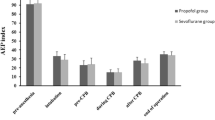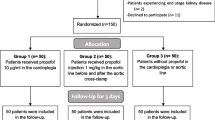Abstract
The aim of this study was to investigate the effect of propofol and its relation to postoperation recovery in children undergoing cardiac surgery with cardiopulmonary bypass (CPB). Twenty ASA class I–II children with congenital heart disease undergoing cardiac surgery were randomly allocated to a propofol group (n = 10) or a control group (n = 10). Blood samples were collected at five time points: before operation (T 0), before the start of CPB (T 1), 25 min after the aorta was cross-clamped (T 2), 30 min after release of the aortic cross-clamp (T 3), and 2 h after the cessation of CPB (T 4). The myocardial samples were collected at the time of incubation into the right atrium before CPB and at 30 min after reperfusion. After CPB, propofol significantly suppressed the increase of the serum lactate dehydrogenase (LDH), creatine phosphokinase (CK), and interleukin-6 (IL-6) levels and the decrease of the serum superoxide dismutase (SOD) level. In addition, propofol inhibited the increase of myocardial nuclear factor-κB (NF-κB) expression and inflammatory cells infiltration after CPB. Furthermore, propofol significantly shortened the tracheal extubation time. In conclusion, propofol exerts a protective effect and improves postoperation recovery through its antioxidant and anti-inflammatory actions in children undergoing cardiac surgery with CPB.



Similar content being viewed by others
References
Altavilla D, Deodato B, Campo GM, Arlotta M, Miano M, Squadrito G et al (2000) IRFI 042, a novel dual vitamin E-like antioxidant, inhibits activation of nuclear factor-kappaB and reduces the inflammatory response in myocardial ischemia-reperfusion injury. Cardiovasc Res 47:515–528
An K, Shu H, Huang W, Huang X, Xu M, Yang L et al (2008) Effects of propofol on pulmonary inflammatory response and dysfunction induced by cardiopulmonary bypass. Anaesthesia 63:1187–1192
Cavalca V, Colli S, Veglia F, Eligini S, Zingaro L, Squellerio I et al (2008) Anesthetic propofol enhances plasma gamma-tocopherol levels in patients undergoing cardiac surgery. Anesthesiology 108:988–997
Corcoran TB, Engel A, Sakamoto H, O’Callaghan-Enright S, O’Donnell A, Heffron JA et al (2004) The effects of propofol on lipid peroxidation and inflammatory response in elective coronary artery bypass grafting. J Cardiothorac Vasc Anesth 18:592–604
Corcoran TB, Engel A, Sakamoto H, O’Shea A, O’Callaghan-Enright S, Shorten GD (2006) The effects of propofol on neutrophil function, lipid peroxidation and inflammatory response during elective coronary artery bypass grafting in patients with impaired ventricular function. Br J Anaesth 97:825–831
Evans ZP, Mandavilli BS, Ellett JD, Rodwell D, Fariss MW, Fiorini RN et al (2009) Vitamin E succinate enhances steatotic liver energy status and prevents oxidative damage following ischemia/reperfusion. Transplant Proc 41:4094–4098
Fan H, Sun B, Gu Q, Lafond-Walker A, Cao S, Becker LC (2002) Oxygen radicals trigger activation of NF-kappaB and AP-1 and upregulation of ICAM-1 in reperfused canine heart. Am J Physiol Heart Circ Physiol 282:H1778–H1786
Ji L, Fu F, Zhang L, Liu W, Cai X, Zhang L et al (2010) Insulin attenuates myocardial ischemia/reperfusion injury via reducing oxidative/nitrative stress. Am J Physiol Endocrinol Metab 298:E871–E880
Kokita N, Hara A, Abiko Y, Arakawa J, Hashizume H, Namiki A (1998) Propofol improves functional and metabolic recovery in ischemic reperfused isolated rat hearts. Anesth Analg 86:252–258
Kukielka GL, Hawkins HK, Michael L, Manning AM, Youker K, Lane C et al (1993) Regulation of intercellular adhesion molecule-1 (ICAM-1) in ischemic and reperfused canine myocardium. J Clin Investig 92:1504–1516
Levonen AL, Vähäkangas E, Koponen JK, Ylä-Herttuala S (2008) Antioxidant gene therapy for cardiovascular disease: current status and future perspectives. Circulation 117:2142–2150
Murphy GJ, Angelini GD (2004) Side effects of cardiopulmonary bypass: What is the reality? J Card Surg 19:481–488
Nelson SK, Bose S, Rizeq M, McCord JM (2005) Oxidative stress in organ preservation: a multifaceted approach to cardioplegia. Biomed Pharmacother 59:149–157
Shin IW, Jang IS, Lee SH, Baik JS, Park KE, Sohn JT et al (2010) Propofol has delayed myocardial protective effects after a regional ischemia/reperfusion injury in an in vivo rat heart model. Korean J Anesthesiol 58:378–382
Suleiman MS, Zacharowski K, Angelini GD (2008) Inflammatory response and cardioprotection during open-heart surgery: the importance of anaesthetics. Br J Pharmacol 153:21–33
Toledo-Pereyra LH, Lopez-Neblina F, Toledo AH (2004) Reactive oxygen species and molecular biology of ischemia/reperfusion. Ann Transplant 9:81–83
Wang B, Shravah J, Luo H, Raedschelders K, Chen DD, Ansley DM (2009) Propofol protects against hydrogen peroxide-induced injury in cardiac H9c2 cells via Akt activation and Bcl-2 up-regulation. Biochem Biophys Res Commun 389:105–111
Xia Z, Godin DV, Chang TK, Ansley DM (2003) Dose-dependent protection of cardiac function by propofol during ischemia and early reperfusion in rats: effects on 15-F2t-isoprostane formation. Can J Physiol Pharmacol 81:14–21
Xia Z, Huang Z, Ansley DM (2006) Large-dose propofol during cardiopulmonary bypass decreases biochemical markers of myocardial injury in coronary surgery patients: a comparison with isoflurane. Anesth Analg 103:527–532
Xia WF, Liu Y, Zhou QS, Tang QZ, Zou HD (2011) Comparison of the effects of propofol and midazolam on inflammation and oxidase stress in children with congenital heart disease undergoing cardiac surgery. Yonsei Med J 52:326–332
Xu JH, Zhao YY, Wang JK, Yuan ZG, Zhang TZ (2010) Effects of mouse recombinant bone morphogenetic protein-7 transfection on cell apoptosis, NF-kappaB, and downstream genes in cultured primary cardiomyocytes after simulated ischemia and reperfusion injury. J Cardiovasc Pharmacol 56:69–77
Zhang SH, Wang SY, Yao SL (2004) Antioxidative effect of propofol during cardiopulmonary bypass in adults. Acta Pharmacol Sin 25:334–340
Zheng JH, Gao BT, Jiang ZM, Yu XQ, Xu ZW (2010) Evaluation of early macrophage activation and NF-kappaB activity in pulmonary injury caused by deep hypothermia circulatory arrest: an experimental study. Pediatr Cardiol 31:215–221
Acknowledgment
This work was supported by a grant from scientific and technological project of Hubei Province of China (No. 301140525).
Author information
Authors and Affiliations
Corresponding author
Additional information
W. Xia and Y. Liu contributed equally to this work.
Rights and permissions
About this article
Cite this article
Xia, Wf., Liu, Y., Zhou, Qs. et al. Protective Effect of Propofol and Its Relation to Postoperation Recovery in Children Undergoing Cardiac Surgery with Cardiopulmonary Bypass. Pediatr Cardiol 32, 940–946 (2011). https://doi.org/10.1007/s00246-011-0018-5
Received:
Accepted:
Published:
Issue Date:
DOI: https://doi.org/10.1007/s00246-011-0018-5




